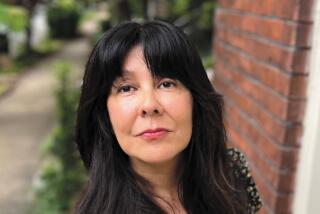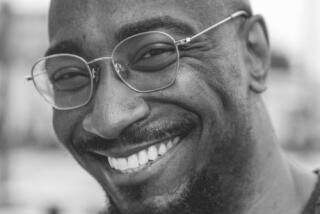Review: The strange, savage universe of Ottessa Moshfegh’s ‘Eileen’
One of my favorite lines in poetry is the opener to Anne Sexton’s 1962 “For Eleanor Boylan Talking with God,” which begins, “God has a brown voice,/ as soft and full as beer.” These lines swill around in my head whenever I enter one of the strange universes of Ottessa Moshfegh. Moshfegh has a brown voice, soft and full as beer, sure — but other brown things too: earthy, mundane, unassuming, fertile, even fecal.
But compared with her debut, last year’s celebrated novella, “McGlue,” and many of her stories (published in places like the Paris Review), the novel “Eileen” is Moshfegh’s most conventional work, almost classical by her canon, and yet my guess is many will join me in finding it her best work yet.
“Eileen” adopts convention and dips it into murky Moshfeghian brown, which is more staunch bleakness and delightful filth than any antique sepia. The most experimental element is the point-of-view: The story is being told by Eileen Dunlop in her 70s looking back on the week around Christmas 1964. And there is also the voice, fashioned like the disconcerting conscience of a David Lynch heroine: “Having to breathe was an embarrassment in itself. This was the kind of girl I was.” This is a portrait of the most miserable, most bored, most “nothing special” (Moshfegh’s often-repeated words) protagonist you might meet, from looks to spirit.
SIGN UP for the free Essential Arts & Culture newsletter >>
The novel fixates on solitude and isolation, alcoholism and child abuse, the icy gray New England suburbia of her town, “X-Ville,” and the even grayer ambience of Moorehead, the boys’ juvenile detention center where Eileen works. She lives alone with her retired-cop alcoholic father since the death of her mother, and her relationship with him seems limited to buying him bottles of alcohol and avoiding him altogether. Her work life seems also unbearable, other than brief minutes when her fantasy life takes her to her crush, a security guard named Randy, who most likely doesn’t know she exists.
All this changes when a new hire arrives: Rebecca Saint John, a social worker whose unattainable, effortless glamour and even more unattainable casual iconoclasm instantly appeal to Eileen. She falls in love with her — though Eileen is careful to emphasize she is not a lesbian. The two become unlikely friends and then the story, three-fourths of the way in, takes its sharp, unforgettable turn. All one can say is, Rebecca is not what she seems, but she might be Eileen’s one hope in her one goal: to get out of her current life, whether that means getting to her dream city of New York or simply exiting X-Ville forever.
Moshfegh might bear the markings of a quirky unknown on the fringes (in an interview with writer Sarah Gerard for Hazlitt last month her manicpixiedream element came on strong with quotes like “well, I’m not from this dimension. I’m like an alien in a human body. I come from a different place, a different plane of existence”), but in reality she is anything but an outsider. Moshfegh received the 2013 Plimpton Prize for Fiction from the Paris Review, she was a recipient of a 2014 National Endowment for the Arts Fellowship and just completed Stanford’s prestigious Stegner Fellowship. And “McGlue” — a 19th century tale of an alcoholic sailor struggling to come to grips with allegations he’s killed a man — was selected by Rivka Galchen as the winner of the first Fence Modern Prize in Prose.
What makes Moshfegh an important writer — and I’d even say crucial — is that she is unlike any other author (male, female, Iranian, American, etc.). And this sui generis quality is cemented by the singular savage suburban noir of “Eileen.” She tries relentlessly to pull you away and out, not unlike her own self-destructive characters, who seem a bit addicted to their own repulsiveness. Moshfegh’s palettes are big and small, fictional realms that are often vague in a way that makes them allegorical almost, universal in their blurriness and yet at the same time meticulously rendered with specific details. And she often does this with little attention to theme. Her fiction offers a sense that is of our world but also altogether hostile to clear distillation of it. Here is art that manages to reject artifice and yet be something wholly new and itself in sheer artistry.
You read Moshfegh to hear Moshfegh through her characters, as you might Donald Barthelme — the author’s sensibility is almost a character in itself. Of course, to be a writer of any import, that self has to be interesting in some way or another. Whether she’s writing about a lonely Chinese man with a prostitute habit who finds love text messaging a computer arcade manager in her story “Disgust” or chronicling her late-in-life apprecation of mayonnaise because of a phobic mother (“Anything to Make You Happy”), Moshfegh manages to be consistently interesting. And maybe that is truly the most important task of art, to make something that catches our eye and captures our imaginations among all that is desolate, drab and indeed terrestrial-brown around us.
::
Eileen
Ottessa Moshfegh
Penguin Press: 260 pp., $25.95
Khakpour is the author, most recently, of “The Last Illusion.”
More to Read
Sign up for our Book Club newsletter
Get the latest news, events and more from the Los Angeles Times Book Club, and help us get L.A. reading and talking.
You may occasionally receive promotional content from the Los Angeles Times.






